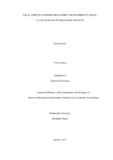
Please use this identifier to cite or link to this item:
https://hdl.handle.net/20.500.14301/238| Title: | LOCAL ASPECTS OF RENEWABLE ENERGY DEVELOPMENT IN NEPAL: A CASE OF MICRO HYDRO POWER PROJECTS |
| Authors: | Kandel, Sajani |
| Citation: | Kandel, S.(2014). “Local Aspects of Renewable Energy Development in Nepal: A Case of Micro Hydro Power Projects |
| Issue Date: | 2014 |
| School: | SOED |
| Department: | DODE |
| Abstract: | With wide spread implementation of renewable energy technologies micro hydropower plants have become an important source of renewable energy for the rural poor. Its importance in terms of environmental, technical and economical aspect is well admired by local community with few exceptions, neglecting social component of electrification. On this basis the study focuses on people’s perception regarding renewable energy (focus on micro hydro), their involvement in development of MHP and changes fostered in livelihood of local people due to access to electricity. Furthermore, it also explores how delinquencies in managerial and technical aspect can affect so called wide spread development of renewable energy technologies. The study aligns to pragmatic paradigm using both quantitative and qualitative methods and is confined to micro hydro power users only. For quantitative method the study used questionnaire survey whereas for qualitative method Key Informant Interview (KII) and Focus Group Discussion (FGD) were used. The study reports that electricity from micro hydropower plants can foster changes in habits of the residents that lead to stronger livelihoods. The ability to turn on a light bulb in the evening has important implications as they can reduce consumption of kerosene, have more hours of light in the evening and spend more ii hours studying. By powering light machinery, electricity has been able to reduce drudgery for women and has allowed women to rest longer. Electricity introduced technologies, like mills, computers have been able to influence small changes in the daily lives of the rural poor people but these factors were found to be highly depended upon ownership, managerial and technical details as no proper involvement of local people has constrained strengthening capacity of micro hydro power projects and its impacts on community. Furthermore, constructing a piece of technology and handing it over without giving proper guidance and putting a place for feedback system has constrained expansion of micro hydro. The limited efforts of government and supporting donor’s accountability towards the rural poor have compelled them to accept what they are given. So development planners, donors and the government, with attempts like handing over decision making to the beneficiaries themselves need to have efficient and effective system that follows up or else it would give unsustainable projects. Keywords: Renewable Technologies, Micro hydro, Perception, Local involvement, Livelihood, Education |
| URI: | https://hdl.handle.net/20.500.14301/238 |
| Appears in Collections: | Research Project |
Files in This Item:
| File | Description | Size | Format | |
|---|---|---|---|---|
| final thesis-sajani kandel.pdf | 2.67 MB | Adobe PDF |  View/Open |
Items in DSpace are protected by copyright, with all rights reserved, unless otherwise indicated.